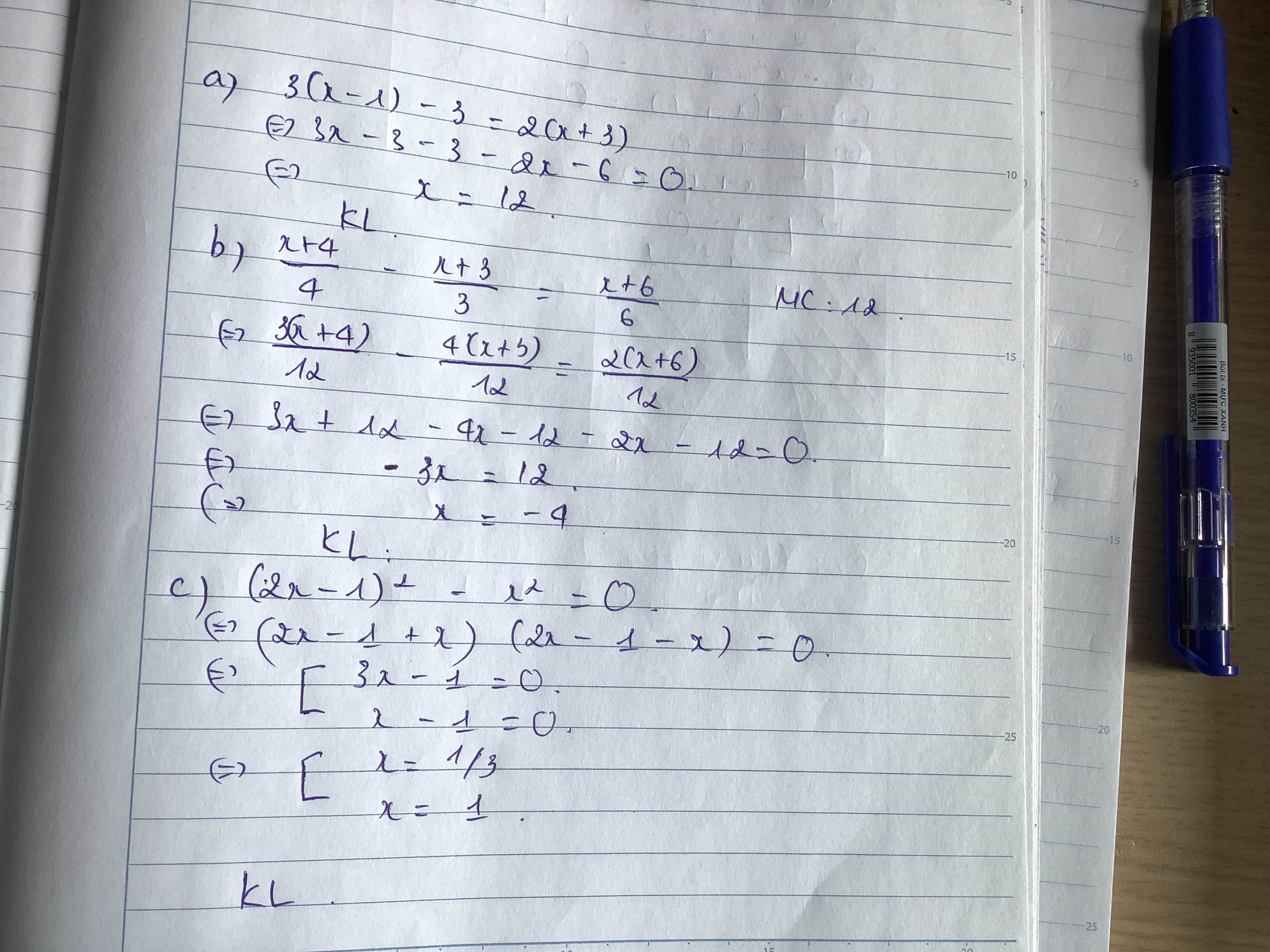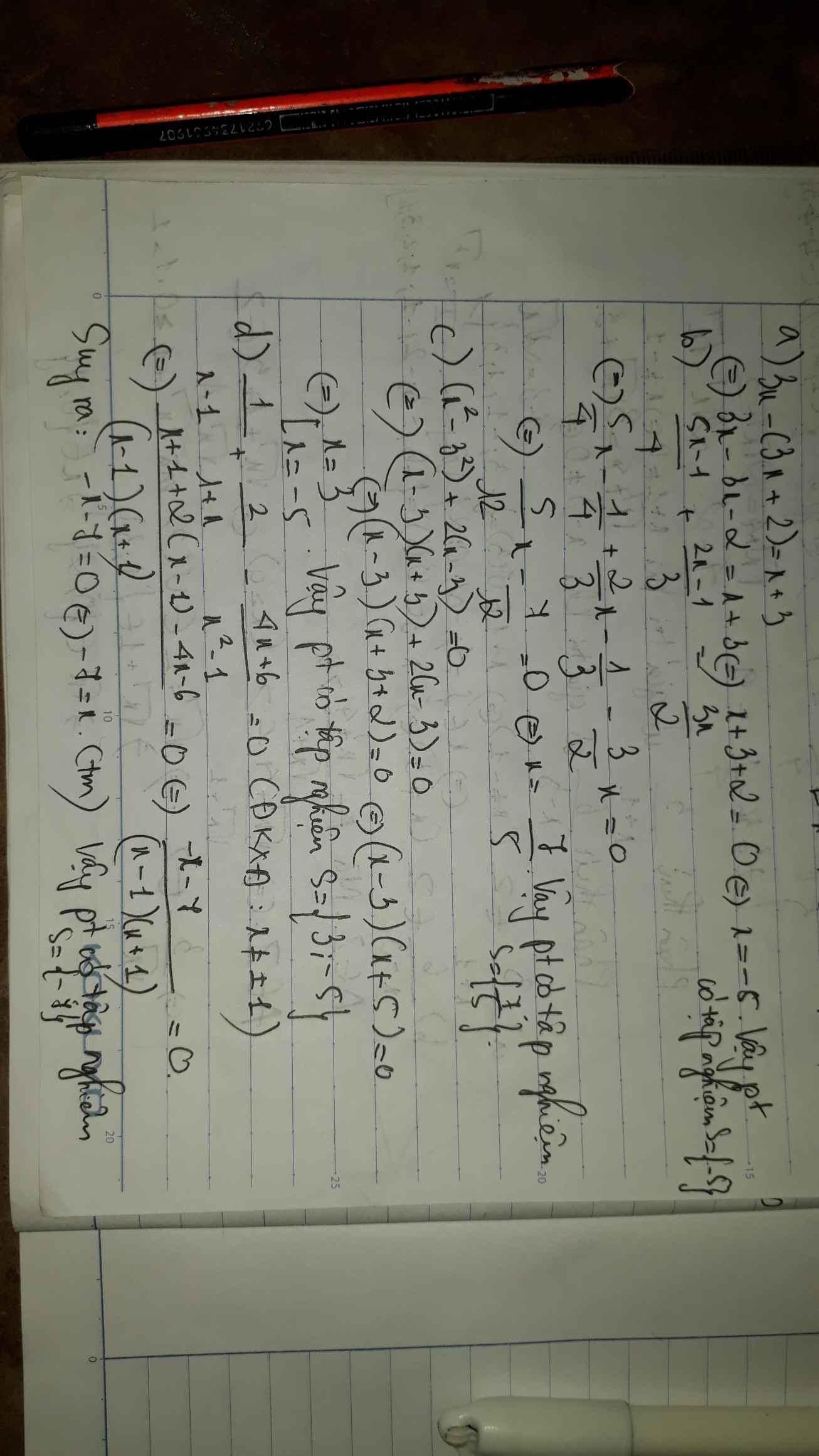gải phương trình\(\dfrac{x-1}{2}-\dfrac{x+1}{15}-\dfrac{2x-13}{6}=0\)

Những câu hỏi liên quan
Gải pt: \(\dfrac{x-1}{13}-\dfrac{2x-13}{15}=\dfrac{3x-15}{27}-\dfrac{4x-27}{29}\)
\(\dfrac{x-1}{13}-\dfrac{2x-13}{15}=\dfrac{3x-15}{27}-\dfrac{2x-27}{29}\)
\(\Leftrightarrow\dfrac{x-1}{13}-1-\dfrac{2x-13}{15}-1=\dfrac{3x-15}{27}-1-\dfrac{2x-27}{29}-1\)
\(\Leftrightarrow\dfrac{x-1-13}{13}-\dfrac{2x-13-15}{15}=\dfrac{3x-15-27}{27}-\dfrac{4x-27-29}{29}\)
\(\Leftrightarrow\dfrac{x-14}{13}-\dfrac{2x-24}{15}=\dfrac{3x-42}{27}-\dfrac{4x-56}{29}\)
\(\Leftrightarrow\dfrac{x-14}{13}-\dfrac{2\left(x-14\right)}{15}-\dfrac{3\left(x-14\right)}{27}-\dfrac{4\left(x-14\right)}{29}=0\)
\(\Leftrightarrow\left(x-14\right)\left(\dfrac{1}{13}-\dfrac{2}{15}-\dfrac{3}{27}-\dfrac{4}{29}\right)=0\)
\(\Leftrightarrow x-14=0\) ( Vì: \(\dfrac{1}{13}-\dfrac{2}{15}-\dfrac{3}{27}-\dfrac{4}{29}\ne0\))
\(\Leftrightarrow x=14\)
Đúng 0
Bình luận (0)
Giaỉ hệ phương trình sau bằng phương pháp thếa)dfrac{1}{x}+dfrac{1}{y}dfrac{1}{2};dfrac{3}{x}-dfrac{4}{y}-1b)dfrac{3}{2x-y}-dfrac{6}{x+y}-1;dfrac{1}{2x-y}-dfrac{1}{x+y}0c)dfrac{5x}{x+1}+dfrac{y}{y-3}27;dfrac{2x}{x+1}-dfrac{3y}{y-3}4d)dfrac{7}{x+2}+dfrac{3}{y}2;dfrac{4}{x+2}-dfrac{1}{y}dfrac{5}{2}e)dfrac{2x}{x+4}+dfrac{2y}{2y-3}27;dfrac{2x}{x+4}-dfrac{6y}{2y-3}4Bạn nào biết thì giải giúp mình với ạ,mình xin cảm ơn ạ!!!
Đọc tiếp
Giaỉ hệ phương trình sau bằng phương pháp thế
a)\(\dfrac{1}{x}+\dfrac{1}{y}=\dfrac{1}{2};\dfrac{3}{x}-\dfrac{4}{y}=-1\)
b)\(\dfrac{3}{2x-y}-\dfrac{6}{x+y}=-1;\dfrac{1}{2x-y}-\dfrac{1}{x+y}=0\)
c)\(\dfrac{5x}{x+1}+\dfrac{y}{y-3}=27;\dfrac{2x}{x+1}-\dfrac{3y}{y-3}=4\)
d)\(\dfrac{7}{x+2}+\dfrac{3}{y}=2;\dfrac{4}{x+2}-\dfrac{1}{y}=\dfrac{5}{2}\)
e)\(\dfrac{2x}{x+4}+\dfrac{2y}{2y-3}=27;\dfrac{2x}{x+4}-\dfrac{6y}{2y-3}=4\)
Bạn nào biết thì giải giúp mình với ạ,mình xin cảm ơn ạ!!!
Trong các phương trình sau phương trình nào là phương trình tương đương với phương trình 2x - 6 = 0:
A. (x - 3)(x2 + 2) = 0
B. 2x + \(\dfrac{1}{x-1}\) = -6 + \(\dfrac{1}{x-1}\)
C. (x2 + 1)(x + 3) = 0
D. x + 3 = 0
giải các phương trình sau
a, 3(x-1) -3=2(x+3)
b, \(\dfrac{x+4}{4}-\dfrac{x+3}{3}=\dfrac{x+6}{6}\)
c,\(\left(2x-1\right)^2-x^2=0\)
d,\(\dfrac{x}{x+3}-\dfrac{2x}{x-3}-\dfrac{3x}{9-x^2}=0\)
d: Ta có: \(\dfrac{x}{x+3}-\dfrac{2x}{x-3}-\dfrac{3x}{9-x^2}=0\)
\(\Leftrightarrow x^2-3x-2x^2-6x+3x=0\)
\(\Leftrightarrow-x^2-6x=0\)
\(\Leftrightarrow-x\left(x+6\right)=0\)
\(\Leftrightarrow\left[{}\begin{matrix}x=0\left(nhận\right)\\x=-6\left(nhận\right)\end{matrix}\right.\)
Đúng 1
Bình luận (0)
a: Ta có: \(3\left(x-1\right)-3=2\left(x+3\right)\)
\(\Leftrightarrow3x-3-3=2x+6\)
\(\Leftrightarrow x=12\)
b: Ta có: \(\dfrac{x+4}{4}-\dfrac{x+3}{3}=\dfrac{x+6}{6}\)
\(\Leftrightarrow3x+12-4x-12=2x+12\)
\(\Leftrightarrow-3x=12\)
hay x=-4
c: Ta có: \(\left(2x-1\right)^2-x^2=0\)
\(\Leftrightarrow\left(x-1\right)\left(3x-1\right)=0\)
\(\Leftrightarrow\left[{}\begin{matrix}x=1\\x=\dfrac{1}{3}\end{matrix}\right.\)
Đúng 0
Bình luận (0)
bài 1 giải các phương trình sau:h,left(dfrac{3}{4}x-1right)left(dfrac{5}{3}x+2right)0bài 2 giải các phương trình sau:b,3x-152x(x-5) m,(1-x)(5x+3)(3x-7)(x-1)d,x(x+6)-7x-420 p,left(2x-1right)^2-40f,x^3+2x^2-left(x-2right)0 r,left(2x-1right)^249h,(3x-1)(6x+1)(x+7)(3x-1) t,left(5x-3right)^2-left(4x-7right)^20j,left(2x-5right)^2-left(x+2right)^20 u,x^2-10x+160w,x...
Đọc tiếp
bài 1 giải các phương trình sau:
h,\(\left(\dfrac{3}{4}x-1\right)\left(\dfrac{5}{3}x+2\right)=0\)
bài 2 giải các phương trình sau:
b,3x-15=2x(x-5) m,(1-x)(5x+3)=(3x-7)(x-1)
d,x(x+6)-7x-42=0 p,\(\left(2x-1\right)^2-4=0\)
f,\(x^3+2x^2-\left(x-2\right)=0\) r,\(\left(2x-1\right)^2=49\)
h,(3x-1)(6x+1)=(x+7)(3x-1) t,\(\left(5x-3\right)^2-\left(4x-7\right)^2=0\)
j,\(\left(2x-5\right)^2-\left(x+2\right)^2=0\) u,\(x^2-10x+16=0\)
w,\(x^2-x-12=0\)
Bài `1:`
`h)(3/4x-1)(5/3x+2)=0`
`=>[(3/4x-1=0),(5/3x+2=0):}=>[(x=4/3),(x=-6/5):}`
______________
Bài `2:`
`b)3x-15=2x(x-5)`
`<=>3(x-5)-2x(x-5)=0`
`<=>(x-5)(3-2x)=0<=>[(x=5),(x=3/2):}`
`d)x(x+6)-7x-42=0`
`<=>x(x+6)-7(x+6)=0`
`<=>(x+6)(x-7)=0<=>[(x=-6),(x=7):}`
`f)x^3-2x^2-(x-2)=0`
`<=>x^2(x-2)-(x-2)=0`
`<=>(x-2)(x^2-1)=0<=>[(x=2),(x^2=1<=>x=+-2):}`
`h)(3x-1)(6x+1)=(x+7)(3x-1)`
`<=>18x^2+3x-6x-1=3x^2-x+21x-7`
`<=>15x^2-23x+6=0<=>15x^2-5x-18x+6=0`
`<=>(3x-1)(5x-1)=0<=>[(x=1/3),(x=1/5):}`
`j)(2x-5)^2-(x+2)^2=0`
`<=>(2x-5-x-2)(2x-5+x+2)=0`
`<=>(x-7)(3x-3)=0<=>[(x=7),(x=1):}`
`w)x^2-x-12=0`
`<=>x^2-4x+3x-12=0`
`<=>(x-4)(x+3)=0<=>[(x=4),(x=-3):}`
Đúng 1
Bình luận (0)
`m)(1-x)(5x+3)=(3x-7)(x-1)`
`<=>(1-x)(5x+3)+(1-x)(3x-7)=0`
`<=>(1-x)(5x+3+3x-7)=0`
`<=>(1-x)(8x-4)=0<=>[(x=1),(x=1/2):}`
`p)(2x-1)^2-4=0`
`<=>(2x-1-2)(2x-1+2)=0`
`<=>(2x-3)(2x+1)=0<=>[(x=3/2),(x=-1/2):}`
`r)(2x-1)^2=49`
`<=>(2x-1-7)(2x-1+7)=0`
`<=>(2x-8)(2x+6)=0<=>[(x=4),(x=-3):}`
`t)(5x-3)^2-(4x-7)^2=0`
`<=>(5x-3-4x+7)(5x-3+4x-7)=0`
`<=>(x+4)(9x-10)=0<=>[(x=-4),(x=10/9):}`
`u)x^2-10x+16=0`
`<=>x^2-8x-2x+16=0`
`<=>(x-2)(x-8)=0<=>[(x=2),(x=8):}`
Đúng 1
Bình luận (0)
Giair các phương trình saua,dfrac{3x^2+7x-10}{x}0 b,dfrac{4x-17}{2x^2+1}0 c,dfrac{left(x^2+2xright)-left(3x-6right)}{x+2}0d,dfrac{x^2-x-6}{x-3}0 e,dfrac{2x-5}{x+5}3 f,dfrac{5}{3x+2}2x-1g,dfrac{x^2-6}{x}x+dfrac{3}{2} h,dfrac{4}{x-2}-x+20 Giups mình với , mik đang cần gấp
Đọc tiếp
Giair các phương trình sau
\(a,\dfrac{3x^2+7x-10}{x}=0\) \(b,\dfrac{4x-17}{2x^2+1}=0\) \(c,\dfrac{\left(x^2+2x\right)-\left(3x-6\right)}{x+2}=0\)
\(d,\dfrac{x^2-x-6}{x-3}=0\) \(e,\dfrac{2x-5}{x+5}=3\) \(f,\)\(\dfrac{5}{3x+2}=2x-1\)
\(g,\dfrac{x^2-6}{x}=x+\dfrac{3}{2}\) \(h,\dfrac{4}{x-2}-x+2=0\)
Giups mình với , mik đang cần gấp
a) ĐKXĐ: \(x\ne0\)
Ta có: \(\dfrac{3x^2+7x-10}{x}=0\)
Suy ra: \(3x^2+7x-10=0\)
\(\Leftrightarrow3x^2-3x+10x-10=0\)
\(\Leftrightarrow3x\left(x-1\right)+10\left(x-1\right)=0\)
\(\Leftrightarrow\left(x-1\right)\left(3x+10\right)=0\)
\(\Leftrightarrow\left[{}\begin{matrix}x-1=0\\3x+10=0\end{matrix}\right.\Leftrightarrow\left[{}\begin{matrix}x=1\\3x=-10\end{matrix}\right.\Leftrightarrow\left[{}\begin{matrix}x=1\\x=-\dfrac{10}{3}\end{matrix}\right.\)
Vậy: \(S=\left\{1;-\dfrac{10}{3}\right\}\)
Đúng 3
Bình luận (0)
a/ \(\dfrac{3x^2+7x-10}{x}=0\)
\(< =>3x^2+7x-10=0\)
\(< =>3x^2+10x-3x-10=0\)
\(< =>\left(3x^2+10x\right)-\left(3x+10\right)=0\)
\(< =>x\left(3x+10\right)-\left(3x+10\right)=0\)
\(< =>\left(3x+10\right)\left(x-1\right)=0\)
\(=>\left\{{}\begin{matrix}3x+10=0=>x=-\dfrac{10}{3}\\x-1=0=>x=1\end{matrix}\right.\)
Vậy tập nghiệm của .....
Đúng 2
Bình luận (0)
Giải các hệ phương trình sau
f.{ (2x - y) (x + 3y) = 4
{ (5x + y) (x + 3y) = 24
g.{ \(\dfrac{8x-5y-3}{7}+\dfrac{11y-4x-7}{5}=12\)
{ \(\dfrac{9x+4y-13}{5}+\dfrac{3\left(x-2\right)}{4}=15\)
h.{\(\dfrac{1}{x}+\dfrac{1}{y}=2\)
{\(\dfrac{3}{x}-\dfrac{4}{y}=-1\)
h) \(\left\{{}\begin{matrix}\dfrac{1}{x}+\dfrac{1}{y}=2\\\dfrac{3}{x}-\dfrac{4}{y}=-1\end{matrix}\right.\)\(\left(1\right)\)\(\left(đk:x,y\ne0\right)\)
Đặt \(a=\dfrac{1}{x},b=\dfrac{1}{y}\)
\(\left(1\right)\Leftrightarrow\) \(\left\{{}\begin{matrix}a+b=2\\3a-4b=-1\end{matrix}\right.\)\(\Leftrightarrow\left\{{}\begin{matrix}3a+3b=6\\3a-4b=-1\end{matrix}\right.\)
\(\Leftrightarrow\left\{{}\begin{matrix}a+b=2\\7b=7\end{matrix}\right.\)\(\Leftrightarrow a=b=1\)
Thay a,b:
\(\Leftrightarrow\dfrac{1}{x}=\dfrac{1}{y}=1\Leftrightarrow x=y=1\left(tm\right)\)
Đúng 1
Bình luận (0)
GIẢI PHƯƠNG TRÌNH1)dfrac{x+1}{35}+dfrac{x+3}{33}dfrac{x+5}{31}+dfrac{x+7}{29}2)x(x+1)(x+2)(x+3)243)dfrac{x-1}{13}-dfrac{2x-13}{15}dfrac{3x-15}{27}-dfrac{4x-27}{29}4)dfrac{1909-x}{91}+dfrac{1907-x}{93}+dfrac{1905-x}{95}+dfrac{1903-x}{91}+40
Đọc tiếp
GIẢI PHƯƠNG TRÌNH
1)\(\dfrac{x+1}{35}+\dfrac{x+3}{33}=\dfrac{x+5}{31}+\dfrac{x+7}{29}\)
2)x(x+1)(x+2)(x+3)=24
3)\(\dfrac{x-1}{13}-\dfrac{2x-13}{15}=\dfrac{3x-15}{27}-\dfrac{4x-27}{29}\)
4)\(\dfrac{1909-x}{91}+\dfrac{1907-x}{93}+\dfrac{1905-x}{95}+\dfrac{1903-x}{91}+4=0\)
![]()
![]()
1) PT \(\Leftrightarrow\left(\dfrac{x+1}{35}+1\right)+\left(\dfrac{x+3}{33}+1\right)=\left(\dfrac{x+5}{31}+1\right)+\left(\dfrac{x+7}{29}+1\right)\)
\(\Leftrightarrow\dfrac{x+36}{35}+\dfrac{x+36}{33}=\dfrac{x+36}{31}+\dfrac{x+36}{29}\)
\(\Leftrightarrow\left(x+36\right)\left(\dfrac{1}{29}+\dfrac{1}{31}-\dfrac{1}{33}-\dfrac{1}{35}\right)=0\)
\(\Leftrightarrow x+36=0\) (Do \(\dfrac{1}{29}+\dfrac{1}{31}-\dfrac{1}{33}-\dfrac{1}{35}>0\))
\(\Leftrightarrow x=-36\).
Vậy nghiệm của pt là x = -36.
Đúng 6
Bình luận (0)
2) x(x+1)(x+2)(x+3)= 24
⇔ x.(x+3) . (x+2).(x+1) = 24
⇔(\(x^2\) + 3x) . (\(x^2\) + 3x + 2) = 24
Đặt \(x^2\)+ 3x = b
⇒ b . (b+2)= 24
Hay: \(b^2\) +2b = 24
⇔\(b^2\) + 2b + 1 = 25
⇔\(\left(b+1\right)^2\)= 25
+ Xét b+1 = 5 ⇒ b=4 ⇒ \(x^2\)+ 3x = 4 ⇒ \(x^2\)+4x-x-4=0 ⇒x(x+4)-(x+4)=0
⇒(x-1)(x+4)=0⇒x=1 và x=-4
+ Xét b+1 = -5 ⇒ b=-6 ⇒ \(x^2\)+3x=-6 ⇒\(x^2\) + 3x + 6=0
⇒\(x^2\) + 2.x.\(\dfrac{3}{2}\) + (\(\dfrac{3}{2}\))2 = - \(\dfrac{15}{4}\) Hay ( \(x^2\) +\(\dfrac{3}{2}\) )2= -\(\dfrac{15}{4}\) (vô lí)
⇒x= 1 và x= 4
Đúng 0
Bình luận (0)
giải các phương trình sau
a, 3x -(3x+2) =x+3
b, \(\dfrac{5x-1}{4}+\dfrac{2x-1}{3}=\dfrac{3x}{2}\)
c, \(\left(x^2-3^2\right)+2\left(x-3\right)=0\)
d,\(\dfrac{1}{x-1}+\dfrac{2}{1+x}-\dfrac{4x+6}{x^2-1}=0\)
a: Ta có: \(3x-\left(3x+2\right)=x+3\)
\(\Leftrightarrow x+3=-2\)
hay x=-5
b: Ta có: \(\dfrac{5x-1}{4}+\dfrac{2x-1}{3}=\dfrac{3x}{2}\)
\(\Leftrightarrow15x-3+8x-4=18x\)
\(\Leftrightarrow5x=7\)
hay \(x=\dfrac{7}{5}\)
Đúng 0
Bình luận (0)




























